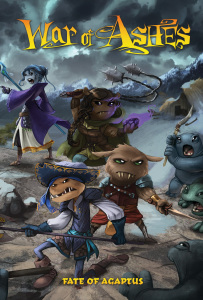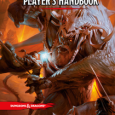 GM: Edmund Metheny
GM: Edmund Metheny
Players: Sean Nittner, Karen Twelves, Sophie Lagacé, and my daughters
System: War of Ashes
After two rounds of alpha and beta playtesting, many internal revisions, and an in depth review of the system from Rob Donoghue, and then a discussion of that review with Fred Hicks, we decided that the existing systems needed more work and refinement, which meant more playtesting! Instead of releasing a third round of open playtesting we opted to playtest it internally so we can make rules changes on the fly and test them.
Our focus was on testing the new systems introduced in War of Ashes:
- Magic – A powerful ability that attracts (usually unwanted) attention from the gods.
- Froth – A pre-combat fervor sentians use to push themselves the extra mile.
- Divine Interest – A method for tracking the attention of the gods.
- Weight – A means to measure the advantages one side has over the other when they outnumber or outweigh (in the case of large critters literally outweigh you).
- Zone Aspects – Already pretty well tested (and vetted) so far, but continuing to play with free aspects in every zone representing the terrain.
- Lethal Damage – Damage that cannot be absorbed with stress, only consequences.
- Maneuvers – Tactical options that are meaningful in WoA due to the inclusion of new mechanics: Zones aspects, weight, and lethal damage.
Phew, that’s a lot to test, but we’re dedicated to doing it. Also thankfully some of the new mechanics (zone aspects and lethal damage) have already proven to work very well. Others like weight we’re sure about how to trigger it (2:1 or 4:1 odds) but just needed to tinker on the effects. And lastly maneuvers are just reinterpretations of overcome and create advantage actions, so it’s just a matter of determining how they should interact with exiting mechanics for things like forced movement (moving someone to a different zone).
The two big ones are at the top of the list Magic and Froth. Those are our big nuts to crack!
Edmund, our beloved and beleaguered GM
Since we’re all still in design mode, Edmund offered to GM for us, which was great. That way were were free to think about the systems without also trying to run the game and present story options for the characters.
We opted for a motley group including ever faction (even a Kuld!) to once again see if we thought it was viable within the fiction. Edmund gave us the prompt that we were all refugees heading to a small town after a Kuld attack. We decided that during the Kuld attack Mac and Cheese (my nine year old’s first response when we asked what her Kuld’s belches smelled like) had some epiphany then and realize it didn’t want to eat us. It seems change was gastrointestinal in nature because the other Kuld could smell the difference and now they wanted to eat Mac and Cheese!
Our characters are:
Vala the Loud – A brave Vidaar warrior who fashions herself an inspiring leader.
Lele – A Jarl survivalist long cut off from the other Jarl, Lele has taken to living off the land.
Semela – An evangelist of Atronia, sent to Brambletown to give them aid (and mostly to get her god attention getting self out of Atronia) but her entourage was lost in the attack.
Ficca – An Elvorix alchemist traveling afar to look for strange new ingredients.
Mac and Cheese – A guldal rider (guldal is called Strawberry because of it’s red coloring with white spots) that must have eaten something strange because it suddenly became cognizant of Sentians as something other than food! A monster battling with it’s identity!
KULD ATTACK!
We started with the attack that left us stranded. The combat was en media res where our supply caravans were already destroyed and while some of the Kuld had been defeated, more were coming.
Edmund sent a several mobs of Kuld and one Ur-Kuld leader after us. Here’s the systems we tested (beyond the normal Fate Core rules):
Zone Aspects – worked great. We started in the wrecked caravan. Near us was snow drift, a frozen lake, and even a “boring spot”. Not only did those aspects get used but they added a lot of fun to the fight. Aces.
Weight – We played with this a lot. As we fought the weight kept changing and moving around in zones made a big difference. Weight put some nice tension in the game but we realized that our current rules (dice fixed with a “+” at 2:1 ratio) prevented us from using the Fate Deck. We also noticed that we kept forgetting to factor in the fixed “+” on the die and that it felt awkward to resize our die pool. “Oh, roll 4dF for most rolls but roll 3dF for these.” While we really liked the Lethal attack that happened when Vaad ran in and was outweighed 4:1 something felt off about giving one kind of bonus (a fixed +) for 2:1 odds, but a different kind of bonus (Lethal damage) for a 4:1 odds.
Froth – Used but barely tested. Vaad frothed and we realized that the uses of it need to be articulated as “as part of an other action” otherwise they are pretty weak. Locking approaches usable was cool, but we didn’t get the oomph we were looking for. More testing.
Lethal Damage – Awesome. Vaad took a gnarly blow she had to eat with consequences. Six stress could have been a moderate consequence and two stress but this was lethal so severe it was. Which lead us to…
Divine Interest – This was quite awesome. With the new rules players can defer consequences they would take to turn into Divine Consequences that affect the whole group, very much like Collateral Consequences from Atomic Robo RPG. And our first one was a big one. Rain of Ylark! Oh yeah, it was awesome watching Lele (the atheist) explain that as a strange weather formation!
Not bad for a single combat. Weight and Froth felt like they needed some work but the other were solid. One change we didn’t expect was in consequences, namely that in Fate Accelerated they go away pretty quickly, and we realized that our mild consequences would drop right after the combat, which felt a lot less “grim” than we wanted, so we added that to the list of rules to review.
A town in shambles made of brambles!
When we arrived at Brambletown we discovered it was named after the wall of brambles that had grown up around the town, serving as a mediocre defense against most foes, but probably just an appetizer for the Kuld.
At first we were told to turn away at the gate, the town was already too full, but when we offered Ylark (and in fact some were still falling from the skies) we were gladly let in. The town itself was divided into four quarters. An large Vidaar district with a grove to Akka-Maas, and Elovrix district, a small Jarl enclave, and a stone walled temple district that the Jarl prohibited any from entering.
When asked who was in charge an Elvorix scholar, a Vidaar bravo, and a Jarl tactician all stepped forward pronouncing they were in charge. Semella then through her hat in the ring. She was sent from Atronia to give aid to Brambletown, she brought everyone Ylark, so she was in charge. I wanted to try Frothing outside a physical battle so I frothed with Flashing (making her Dazzling) and then tried to get Semela appointed as mayor of Brambletown… which was surprisingly easy! Now she got to deal with all the problems!
The first order of business was to enter the temple district, but despite her new appointment, the Jarl would not let anyone in. Lele asked why and was told they were preventing anyone from doing any praying at the temples. Lele suggested that the temples and the stone wall around them should all be broken down and turned into fortifications to protect the town. The Jarl all nodded sagely, liking the idea very much, but Semela was incensed. “You can’t desecrate the gods! Look at all they do for us!” *Ylark Drop*
We decided the debate would be handled as a Contest (First person to win three opposed overcome rolls wins) and I thought “okay, here’s a chance for Frothing with Flashy to shine”. Only… it didn’t. None of our Frothing options made sense in a Contest. I couldn’t do lethal damage (we weren’t attacking), moving my opponent didn’t make any sense, changing my weight was immaterial. Soo… this is a problem. Clearly Froth doesn’t work in a contest, but I also don’t think it would work in a social conflict. That was a problem to address (see below).
The Kuld Are Coming!
The contest end in a tie roll, where the GM is instructed “If there’s a tie for the highest result, no one gets a victory, and an unexpected twist occurs.” What was the twist? Of course, it was the Kuld drawn to our warmth and maybe even the falling Ylark!
Luckily while we had been arguing about what to do with the temples Ficca and Mac and Cheese were working on stacking snow on the wall of brambles and then with the aid of Ficca’s alchemical concoctions turning the snow into hard ice! A frozen bramble wall is better than no bramble wall!
Thoughts on the game
There were some things we didn’t use and should test in future games. Swarm rules, Adventure Approaches, Magic, and Milestones (since we have some new ones).
There were some things we did test that I found wanting, namely Froth. First off, Froth was hard to define in the narrative, what does it actually “do”, and it’s also doesn’t have a clear mechanical effect in the minis game as it can be spent like currency to give each side a wide range of options. I thought on it for a long while and eventually sent this dreaded email to Sophie and Karen (writer/developer and editor).
I’ve been thinking more (dangerous I know) and part of the reason I’m having a hard time with how Froth should work is that Froth isn’t something that is clear in the fiction.
Zones are easy. Relative positioning. Even if we extend that to social conflicts (threats, bribes, persuasion), they hold up pretty well.
Weight is also easy, even if our 2:1 and 4:1 results end up changing, the concept is simple and makes sense.
Froth is, well it’s a lot of things. In Shieldwall is the ability to do tricks or tweak the rules. It’s also something of a bargaining chip (though since the only person you’re bargaining with is your enemy, that mechanic is not a strong one in my opinion). But what it represents is perhaps a bit of extra vigor, courage, or ingenuity. All of those are pretty damn vague and hard to pin down with rules.
I’ve got a radical idea. And please don’t hate for suggesting this.
What if Frothing is a special phase in conflicts (like it is in shieldwall) where all people can do is create advantages. So the clever folks can devise strategy, the forceful ones can bellow thunderous roars, the careful ones can measure the distance to the enemy, etc. End result is that conflicts would start with lots of free invokes on both sides. More for the sides that rolled better. A suggested “cost” for failing the create advantage roll would be taking a consequence which would be similar a bad roll in SW and it’s also something that could be shifted to DI to get the gods interested in the fight.
This would effectively create a “charge up” round like you see in Anima Prime and it would allow players to call on the advantages created to get the same kind of perks/bonuses that Shieldwall offers them.
Also, this would address the point Edmund made, that it’s hard to hurt the players. If your opponents start the fight with say six free invokes and the GM just waits till the players use up a few of their free invokes, it wouldn’t be hard at all to generate a big monster attack.
I know the major downside of this is that it means removing a section that we have put TONS of work into so we shouldn’t consider it lightly, but lets consider it and see if it makes any sense.
And to find out what misadventures that caused, stay tuned for my next report…. Kuld on the wall!
Once again kudos to Edmund and my girls for having the patience to player a game where we stopped every 10 minutes to discuss (and sometimes change) the rules.

